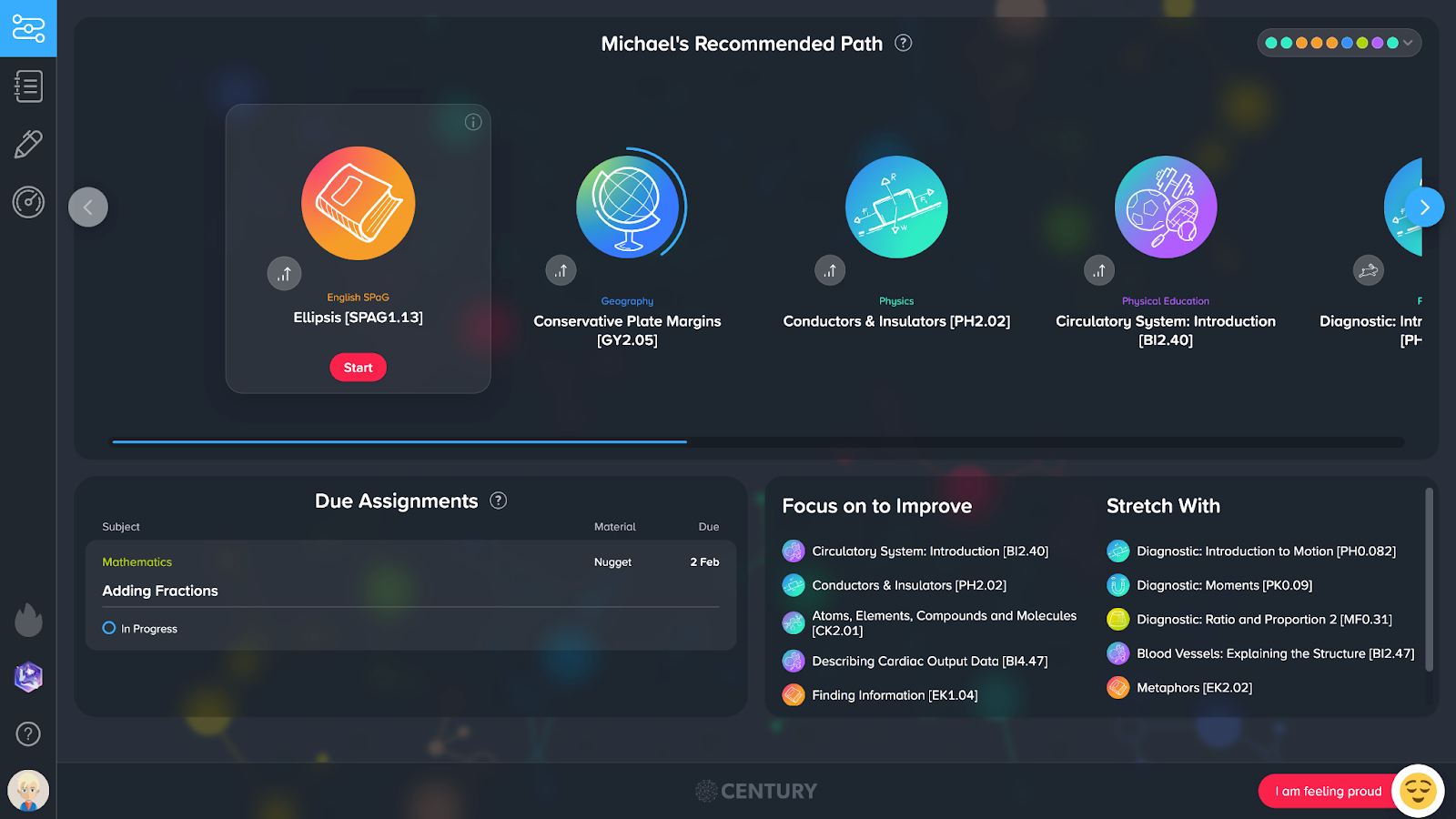Estimated reading time: 9 minutes
Chichester College is a further education college in West Sussex. Katie Colcombe, the CENTURY champion at the college, spoke to us about how the platform is helping them to reduce teacher workload and support student engagement.
Why CENTURY?
We found CENTURY was a really good product to give students individualised, personalised learning that enabled them to make little steps of progress on their path. That has snowballed from there really over the last couple of years.
Initially, the teachers that used the platform most in its first year or so were for Functional Skills, and they found CENTURY really motivating for their learners because it broke the content up into those small steps. It took another year to really embed CENTURY reliably across all staff, because obviously, different staff have different levels of confidence and competence with online learning.
Though some of the teachers struggled at the beginning, the outcome of what CENTURY did for the learner - and the fact you could see learners being engaged outside of class and making progress - really motivated all the teachers. They wanted to make a better use of the resource to engage all learners, and they really embraced it.
In the initial setup phase it took slightly more work to get our heads around it, but now we’re more familiar with the tools available, CENTURY provides an alternative to teachers sitting there at the weekend trawling through marking. At the end of the day, it's a good learning resource and it gives students instant feedback. The answers are there. That's really helped in terms of workload and as staff become more experienced with the whole setup, they become more competent and quicker. It doesn't take as long just to push out an activity or resource to a whole group.
This year, we've moved more towards using assignments because you can track them. That tracking feature was really attractive to us because we wanted to see who is completing the work and who is not, and to have evidence of that.
The AI recommendations that come up for the students are definitely very relevant. From that point of initial assessment to diagnostics to the content, there is a clear thread that helps them focus on the skills they need to learn. When I talk about CENTURY, I say to every student that there is no point practising how to use a capital letter, if you know how to use a capital letter. That’s a waste of time. CENTURY picks up the bits that you still need to work on. The students see that very clearly, and therefore it's good for the staff to push that development as it helps with target setting as well.
What do the learners find most useful?
It’s very useful for students to be able to complete even a small amount of work and to receive instant feedback to see where they’re going great, or if they're not quite right. I build that and model it a lot in the lessons so the students get to understand that this isn't the same as other online learning websites, and it's not the same as whatever they've done in school. It’s better.
It's got the capacity to give feedback to learners all the time: how well they're doing, if they're on a streak, how many minutes or hours have been spent studying, how many questions they’ve answered. The little built-in rewards increase student motivation. Finding student motivation and nurturing it is our biggest enemy, CENTURY definitely helps with that.
Do you use CENTURY more in class or for independent study?
The majority of CENTURY is set for independent learning with an expectation every week. We have to help our learners understand why to bother with CENTURY as opposed to half a dozen other things they use. So we do modelling and completion in class, especially in the first term to get them engaged and going. It helps them understand how easy this is, we’re not asking them to sit down for an hour, it will take fifteen minutes to complete one nugget, from watching the video to finishing the questions.
Individual teachers create their own classes, because it helps them support the teacher-student relationship and back up what’s going on in the classroom. The teacher really knows their students best, so there needs to be that degree of individualisation, because you can't predict a whole 2,000 students are all going to be at the same place by week six. Life is not that simple. Separate cohorts allow each teacher to individualise it and keep pace with what's happening on the ground.
What impact is CENTURY having?
Anecdotally, I looked back through my own students at what happened in the previous year, and my data told me that about 50 percent of the learners who engaged with CENTURY doing reliable pieces of work ended up increasing their result by at least one grade. So there was a connection between practice on CENTURY and progress in maths and English towards a better grade. But it's not a complete picture of the college, because it was just based on my cohort.
I come from a background where I previously taught Functional Skills as well, and I'm absolutely convinced of the value of CENTURY. I've seen it make a massive difference to people's understanding and ability, with maths or English. Occasionally there’ll be someone who says it’s not for them, and that’s fine, because as teachers we have to make that call and have a range of resources, not one-size-fits-all.
What are your plans going forward with CENTURY?
It's really about engagement and making CENTURY more visible around the college. We have displays and competitions to encourage learners to keep up their work completion rate. Competitions work especially well because everybody likes a prize. Last year, we ran a Halloween-themed competition with bags of sweets, treats and pencils. The outcomes of that were great.
We are looking at ways of tracking our learners by department for maths and English, which is a real task because we cover the whole college. One of our managers here, who is a data-god, has worked out a way to collate how learners are doing across different courses, for example the catering students versus the motor vehicle students, which boosts our ability to run these internal competitions and drive engagement.
How have you found Smart IA™?
It's been a very positive tool, and we very quickly got the whole college involved in using it. It’s been very helpful for vocational staff to sit with learners and use the initial assessment, improving their understanding of the particular results and what it means for their literacy and numeracy skills with regard to their main course. It’s publicised how maths and English fit with the rest of the courses. Secondly, the result is reliable so it has provided a really clear starting point for our cohort of learners. Having a reliable tool that will give a judgement for students working at this level is really useful.
The learners found it quite an approachable assessment to do, because of its adaptive nature, they didn't feel like they were having to sit through 50 questions that were not relevant to them before they got to the important stuff, or vice versa, with 50 questions that were too hard for them before they got chucked out the other end. They found it quite a positive experience, they were able to explain what they’d done and knew how it fitted into their main courses. And it then starts them on their CENTURY journey, so when we later pick up CENTURY in class it joins the whole chain of events together.
Learn more here about how CENTURY is helping FE colleges supercharge their teaching and learning.
Book a demo to find out more about the courses, or speak to your Account Manager if you are an existing customer for more information.
Smart IA™ is supported by the Ufi VocTech Trust.





